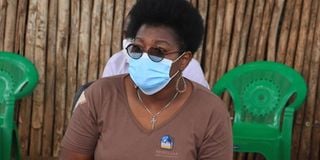Safe houses the missing link in FGM war

What you need to know:
- Gender CAS Rachel Shebesh led a high-powered delegation of government officials in West Pokot to campaign for the abandonment of the practice.
- The CAS, while addressing chiefs and their assistants, stressed on the need to take their role seriously to deal with the vice.
- Appealed to Governor Prof John Lonyangapou to budget for the construction of a safe house, noting that it has been one of the missing links in ending FGM in the area.
With more than 500 girls in West Pokot at the risk of undergoing Female Genital Mutilation (FGM), the government has swung into action to save the situation.
Gender CAS Rachel Shebesh recently led a high-powered delegation of government officials in the area to campaign for the abandonment of the practice.
Accompanied by members of the Anti-FGM Board, Ms Shebesh presided over a meeting attended by national government officials and West Pokot County leaders to map out action plans to fight the vice.
Proposals tabled included construction of a safe house where girls in distress can get refuge from the facing the cut.
MISSING LINK
She appealed to Governor Prof John Lonyangapou to budget for the construction of a safe house, noting that it has been one of the missing links in ending FGM in the area.
The CAS, while addressing chiefs and their assistants, stressed on the need to take their role seriously to deal with the vice.
“I urge you to be more proactive in holding community dialogues and promoting alternative rite of passage. The President has identified EndFGM as one of his legacies, and we are determined to bring everyone on board to actualise his vision,” she said.
In June, reports emerged that since schools were closed in the wake of the Covid-19 pandemic, many girls have been exposed to the cut, a precedence to early marriages.
COUNTY POLICY
Anti-FGM board chairperson Agnes Pareiyo, noted that the outdated practice is derailing the development of girls in the county.
“Chiefs will be held responsible for all girls cut in their villages and will face the law,” said Ms Pareiyo.
She implored on the governor to prioritise on formulation of a county policy on FGM.
“To accelerate EndFGM by 2022, we urge counties to develop their own anti-FGM policies to supplement the national policy to address county-specific needs and gaps. The board is at hand to provide technical support where needed,” she added.
COVID-19
She decried the high prevalence of the outlawed practice since the outbreak of the Covid-19 pandemic in the county with a 74 per cent prevalence.
Prof Lonyangapou announced that the county will work with the national government to roll out anti-FGM programs and campaigns in the area.
West Pokot Woman Representative Lilian Tomitom, said she will work with residents to eradicate the outlawed practice.
“The practice has robbed us of many girls who would have been powerful people in this country but their dreams were cut short by the vice and thereafter, married off,” she said.
The delegation also visited the neighbouring Elegeyo Marakwet County which has FGM prevalence of 53 per cent.
The team held a community baraza with residents of Kapsowar, Marakwet West, a FGM hotspot in the county, during which they educated residents on the dangers of the outlawed practice and the need for alternative rites of passage.
CHANGE MIND-SET
During the meeting, Ms Shebesh urged circumcisers to surrender their tools of trade and denounce the practice.
Elegeyo Marakwet deputy governor Wesley Korir said for girls to prosper, parents, youth and women have to be targeted in changing mind-sets towards the vice.
Woman Representative Joyce Chebaibai challenged men to come out strongly and condemn the practice since they are its consumers.
“I commit to set aside funds through the kitty availed to her by the government to construct a rescue and rehabilitation centre for girls,” said Ms Chebaibai.
Marakwet cultural leader Mr Chelang’a Cheptoo said as leaders, they will continue working with the authorities to end the vice.





